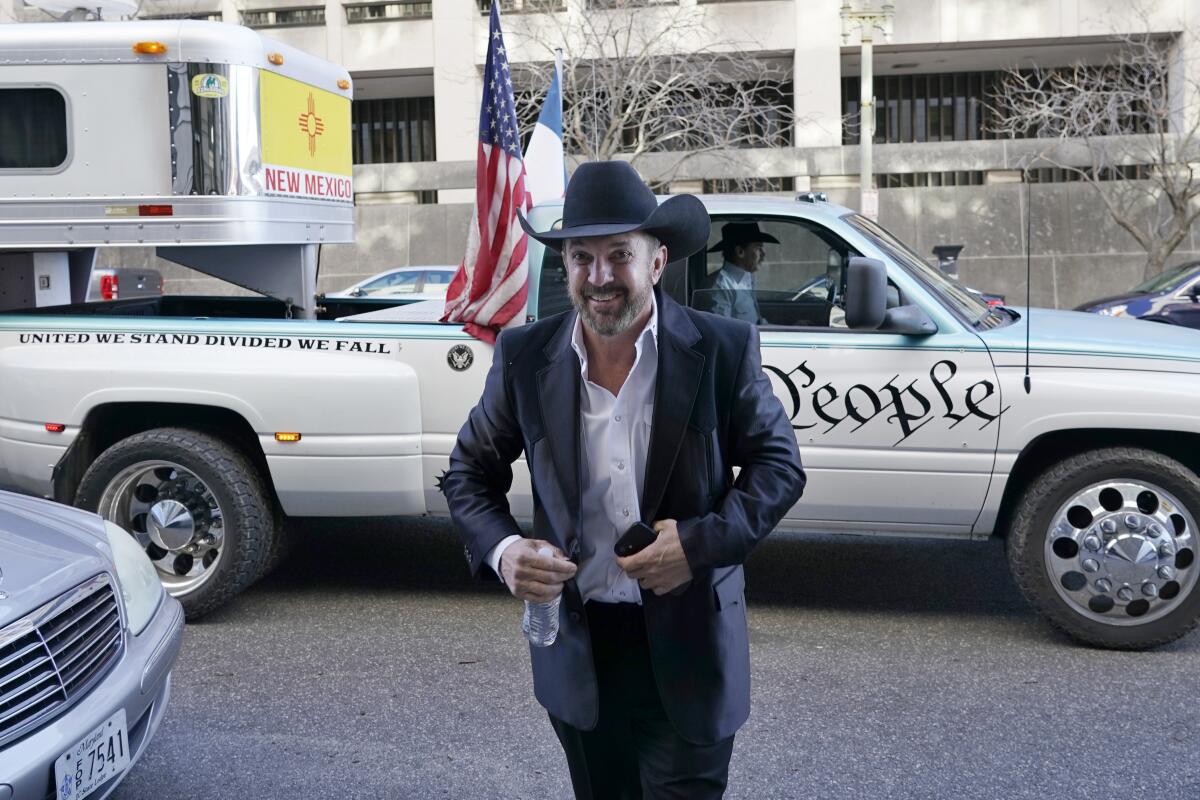Capitol riot trial opens for Cowboys for Trump founder

- Share via
WASHINGTON — An elected official from New Mexico went to trial Monday with a judge — not a jury — set to decide if he is guilty of charges that he illegally entered the U.S. Capitol grounds on the day a pro-Trump mob disrupted the certification of Joe Biden’s presidential election victory.
U.S. District Judge Trevor McFadden is scheduled to hear attorneys’ closing arguments Tuesday for the case against Otero County Commissioner Couy Griffin, whose trial in Washington, D.C., is the second among the hundreds of people charged with federal crimes related to the siege of Jan. 6, 2021.
The judge heard testimony Monday from three government witnesses. Griffin’s lawyer said he doesn’t plan to call any defense witnesses.
Griffin, one of three members of the Otero County Commission in southern New Mexico, is among a handful of riot defendants who either held public office or ran for a government leadership post in the 2½ years before the attack.
He is among only three riot defendants who have asked for a bench trial, which means a judge will decide his case without a jury.
Griffin, a 48-year-old former rodeo rider and former pastor, helped found a political committee called Cowboys for Trump. He had vowed to arrive at the courthouse on horseback. Instead, he showed up Monday in a pickup truck.
Griffin is charged with two misdemeanors: entering and remaining in a restricted building or grounds and disorderly and disruptive conduct in a restricted building or grounds.
A key question in Griffin’s case is whether he entered a restricted area while Vice President Mike Pence was on Capitol grounds, a prerequisite for the U.S. Secret Service to invoke access restrictions.
Griffin’s attorneys said in a court filing that Pence had departed the restricted area before the earliest that Griffin could have entered it; however, Secret Service inspector Lanelle Hawa testified that Pence never left the restricted area during the riot.
She said agents took Pence from his office at the Capitol to a secure location at an underground loading dock on the Capitol complex. Pence remained in the loading dock location for four to five hours and never left the security perimeter before the joint session of Congress resumed on the night of Jan. 6, Hawa testified.
Defense attorney Nicholas Smith asked Hawa if it was Pence’s decision to remain there for hours.
“I can’t answer that,” she said.
Smith said prosecutors apparently believe Griffin engaged in disorderly conduct by peacefully leading a prayer on the Capitol steps.
“That is offensive and wrong,” Smith told the judge during his brief opening statements.
Prosecutors didn’t give opening statements. Their first witness was Matthew Struck, who joined Griffin at the Capitol and served as his videographer. Struck has an immunity deal with prosecutors for his testimony.
After attending then-President Trump’s “Stop the Steal” rally on Jan. 6, Griffin and Struck walked over barriers and up a staircase to enter a stage that was under construction on the Capitol’s Lower West Terrace for Biden’s inauguration, according to prosecutors.
Prosecutors played video clips that showed Griffin moving through the mob that formed outside the Capitol, where police used pepper spray to quell rioters.
“I love the smell of napalm in the air,” Griffin said in an apparent reference to the war movie “Apocalypse Now.”
After climbing over a stone wall and entering a restricted area outside the Capitol, Griffin said, “This is our house … we should all be armed,” according to prosecutors. He called it “a great day for America” and added, “The people are showing that they have had enough,” prosecutors said.
Struck testified that he and Griffin went to the Capitol to find a place to pray. Smith asked Struck if anybody appeared to be “riled up” by the prayer that Griffin led.
“They started chanting, ‘Pray for Trump,’” Struck replied. “It looks like they’ve been calm and they’re listening to Couy.”
In a court filing, prosecutors called Griffin “an inflammatory provocateur and fabulist who engages in racist invective and propounds baseless conspiracy theories, including that Communist China stole the 2020 Presidential Election.”
Griffin’s attorneys say hundreds if not thousands of other people did exactly what Griffin did on Jan. 6 and haven’t been charged with any crimes.
“The evidence will show that the government selected Griffin for prosecution based on the fact that he gave a speech and led a prayer at the Capitol, that is, selected him based on protected expression,” they wrote.
More than 770 people have been charged with federal crimes related to the Capitol riot. More than 230 riot defendants have pleaded guilty, mostly to misdemeanors, and at least 127 of them have been sentenced. About 100 others have trial dates.
Earlier this month, a jury convicted Guy Wesley Reffitt of storming the Capitol with a holstered handgun in the first trial for a Capitol riot defendant. Jurors also convicted the Texas resident of obstructing Congress from certifying the Electoral College vote on Jan. 6, of interfering with police officers who were guarding the Capitol and of threatening his two teenage children if they reported him to law enforcement.
Reffitt’s conviction on all charges could give prosecutors more leverage in negotiating plea deals in many other cases or discourage other defendants from going to trial. The outcome of Griffin’s trial also could have a ripple effect, helping others decide whether to let a judge or a jury decide their case.
Associated Press writer Jacques Billeaud in Phoenix contributed to this report.
More to Read
Sign up for Essential California
The most important California stories and recommendations in your inbox every morning.
You may occasionally receive promotional content from the Los Angeles Times.












